In addition to Weibo, there is also WeChat
Please pay attention

WeChat public account
AutoBeta


2024-11-23 Update From: AutoBeta autobeta NAV: AutoBeta > News >
Share
AutoBeta(AutoBeta.net)04/05 Report--
At present, obvious changes are taking place between the new energy vehicle market and the traditional fuel vehicle market. According to the data, the total number of wholesale new energy passenger vehicles in China in 2021 increased by 181.0% year-on-year to 3.312 million, and retail sales increased by 169.1% to 2.989 million. In 2021, the total number of domestic fuel vehicle wholesale fell by 4% to 17.79 million, and retail sales decreased by 6% to 17.16 million.
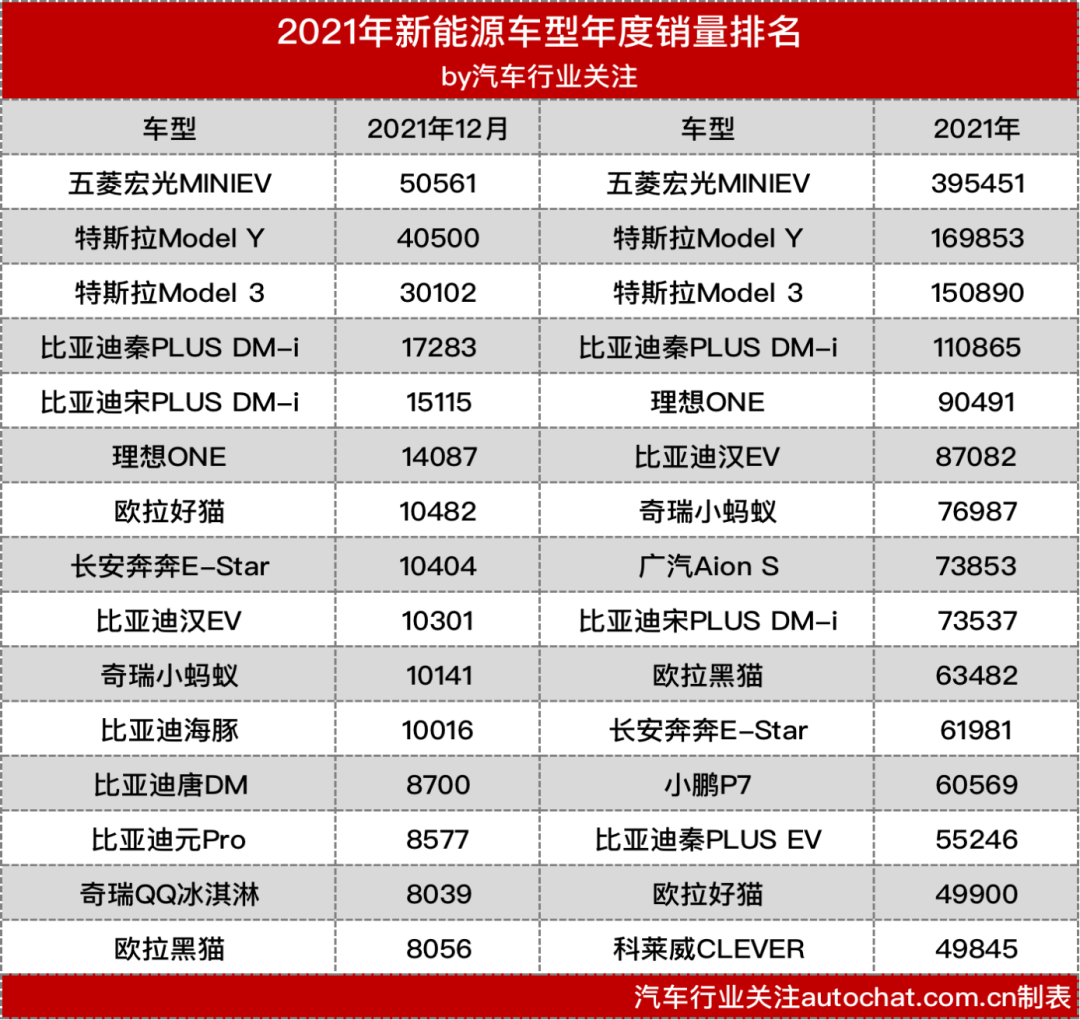
According to the data, fuel vehicles occupy the dominant position in the automobile industry. however, by contrast, fuel vehicles have declined year on year in 2021, and new energy vehicles have achieved year-on-year growth. In a sense, the growth of new energy vehicles and the decline of traditional fuel vehicles also reflect that new energy vehicles are gradually replacing the fuel vehicle market, while more and more fuel vehicles are transforming to the new energy vehicle market. The automobile industry is concerned that the fuel vehicle market will gradually decline in the future, while the new energy market will grow steadily and eventually replace fuel vehicles.
In this context, a number of car companies around the world have also begun to accelerate the transformation to new energy. So far, a number of car companies have announced their plans to stop selling fuel vehicles. To this end, the automobile industry has focused on sorting out the time plans for the suspension of fuel vehicles announced by some car companies.
BYD Automotive: total suspension of sales of fuel vehicles in March 2022
As the leader of new energy vehicles, BYD first announced its withdrawal from the fuel vehicle market on April 3, becoming the first traditional car company in the world to stop the production of fuel vehicles. According to the company's strategic development needs, BYD has stopped vehicle production of fuel-fueled vehicles since March 2022, BYD said in a "statement on the production of fuel-fueled vehicles." In the future, in the automotive sector, the company will focus on pure electric and plug-in hybrid vehicles. At the same time, the company will continue to produce and supply fuel auto parts to provide existing fuel car customers with continuous service and after-sales protection, as well as the supply of spare parts throughout the life cycle to ensure worry-free operation.
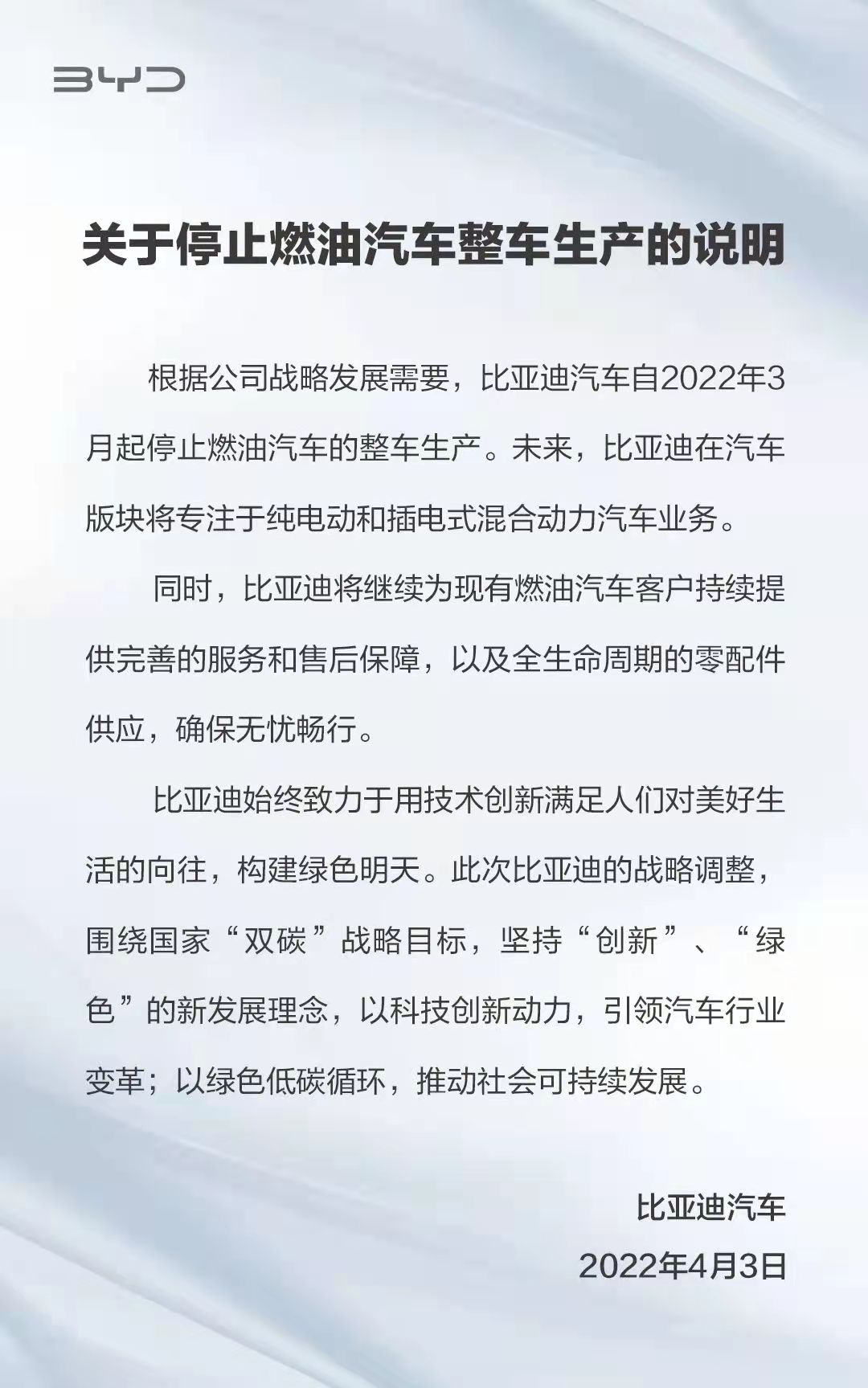
At present, BYD dealers in some parts of the country are cleaning up the inventory of fuel cars in their stores, according to the car Emperor. Among them, a BYD dealer in Beijing said: at present, there is no fuel version of Song MAX; in the store, and the BYD dealership in Guangzhou said: BYD F3 has stopped production, and there are no cars in the store; a BYD dealer in Gansu said: the sales volume of fuel vehicles only accounts for about 3% of the vehicles in the store. At present, the store will clear out the fuel cars in stock. A BYD dealer in Henan said that users who bought fuel cars accounted for 15% of the total turnover last month. At present, only two fuel models are on sale in the store, and discounts of 7000 yuan to 8000 yuan are now available in the store.
Data show that BYD sold 2795 fuel vehicles in February 2022, down 84.6% from a year earlier, and zero fuel car sales in March 2022, including sedans, SUV and MPV. In March's production and sales data, BYD produced 106658 vehicles, up 173.4% from 39007 in the same period in 2021, and sold 104878 vehicles, up 156.9% from 40817 in the same period in 2021. Specifically, BYD sold 104878 new energy vehicles, up 333.1 percent from 24218 in the same period in 2021, of which 104338 were new energy passenger vehicles, up 345.2 percent from 23386 in the same period in 2021.
Looking back to 2021, although the global auto market was affected by the supply of spare parts, BYD still achieved satisfactory sales results. BYD sold 730093 vehicles in 2021, an increase of 75.4 percent over the same period last year, of which the sales of new energy passenger vehicles reached 593745, an increase of 231.60 percent. For its annual sales target of 2022, BYD set a target of 1.2 million vehicles and said that if the supply chain is good, it will hit the annual sales target of 2 million vehicles.
According to the data, BYD sold a total of 291378 vehicles in the first quarter of 2022. According to the annual target of 1.2 million vehicles, BYD has achieved 24.3% of its annual target in the first quarter. BYD's new energy vehicles will be responsible for the remaining 75.7% and will be completed in three quarters.
BAIC Group: total suspension of sales of fuel vehicles in 2025
As early as 2018, BAIC announced that it expects to completely stop the sale of fuel cars by 2025, and plans to take the lead in halting the sale of its own brand of traditional fuel passenger cars in Beijing by 2020. At present, BAIC has further clarified this goal, and it is only a matter of time before the total suspension of the sale of fuel vehicles by 2025. Data show that BAIC Langu, a new energy vehicle division of BAIC, which owns two product brands ARCFOX and BEIJING, achieved total sales of 26127 vehicles during the reporting period, up 0.82% from 25914 in 2020. It is worth mentioning that at present, part of the sales and income of Beijing cars comes from Beijing Mercedes-Benz, and Mercedes-Benz is also in a critical period of transition to electrification.
Mercedes-Benz expects to design factories for pure electric vehicle production lines according to market demand in the years after 2025. According to Mercedes-Benz's previous plan, it plans to achieve 50% of total sales of pure electric and plug-in hybrid models in 2025, and stop selling fuel cars in 2030, that is, new car sales will basically be converted to pure electric models in 2030. In addition, starting from 2025, all newly released models of Mercedes-Benz will be pure electric platforms, and each of its models will provide pure electric version options. at that time, Mercedes-Benz will launch three new pure electric model architecture platforms, covering all medium and large passenger cars, performance electric vehicles, pure electric MPV and light commercial vehicles.
Changan Automobile: completely stop the sale of fuel vehicles in 2025
In October 2017, Changan Automobile announced the Shangri-La Plan, which aims directly at the new energy vehicle market. According to the plan, Changan Automobile will invest more than 100 billion yuan in new energy in the next eight years, and will completely stop the sale of traditional fuel vehicles by 2025. On March 26 last month, Zhu Huarong, party secretary and chairman of Changan Automobile, also said that with the acceleration of new energy vehicles, the competition in China's fuel vehicle market will be more fierce. There are 85 brands in the traditional fuel vehicle market in 2021. Among them, 34 brands sell less than 1,000 sets per month, and 9 brands die out. Zhu Huarong believes that in the next 3-5 years, 80% of Chinese fuel car brands will "close down and merge" (that is, close down, stop production, merge and transform). To put it simply, in the next 3-5 years, only a small number of car companies will be able to continue to develop in the Chinese market as fuel vehicles, while others will either close down, merge or transform.
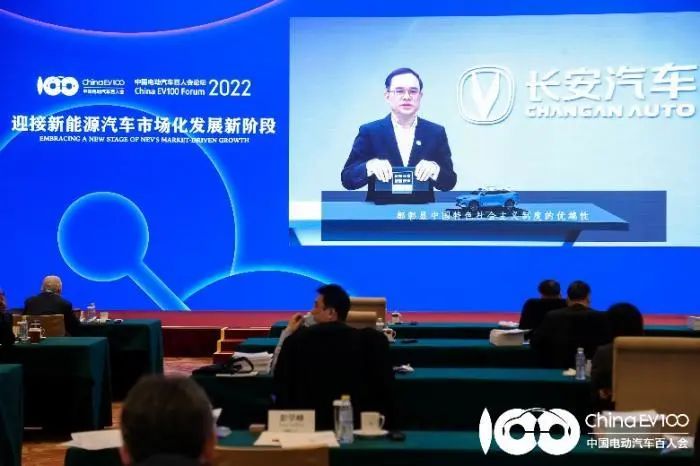
Toyota: stop selling fuel vehicles in China, Europe and North America in 2030; completely stop selling fuel vehicles under the Lexus brand in 2035
It is well known that Toyota CEO Akio Toyoda is a staunch opponent of pure electric cars and can be said to be completely interested in electric cars, until Toyota launched 30 electric cars in December last year. Akio Toyoda began to have a very obvious change in electric cars.
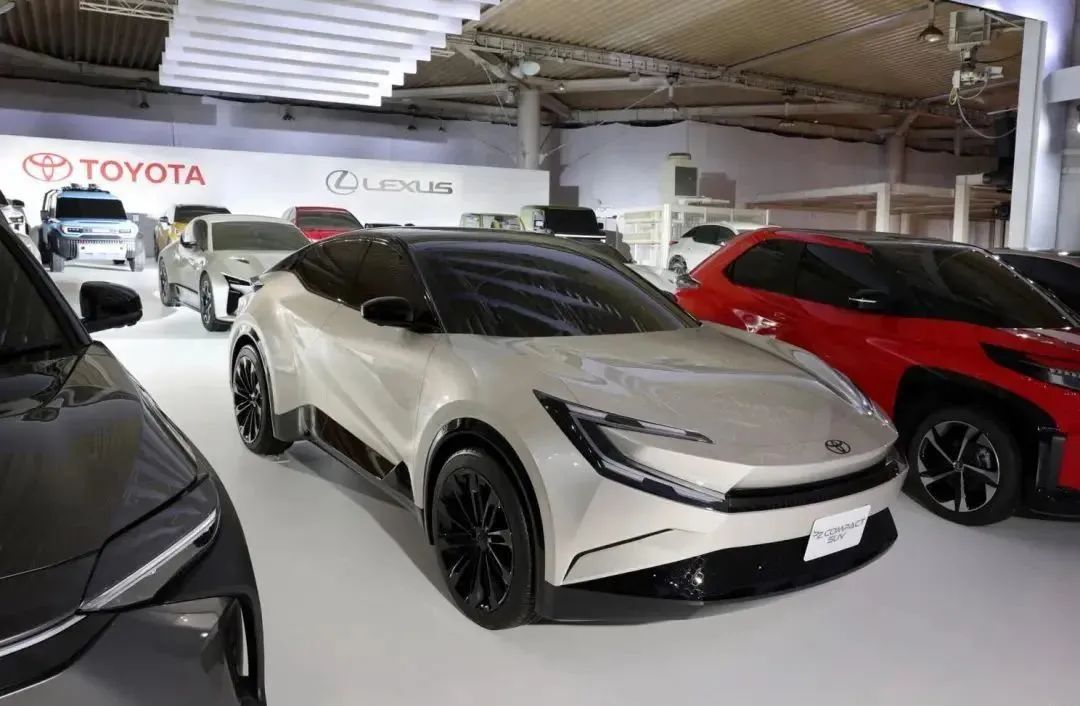
Toyota, as a global automobile giant, has also made a self-revolution in the face of the general trend. On December 14, 2021, Akio Toyoda unveiled a strategy presentation for battery electric vehicles with 15 new electric vehicles and announced a 10-year plan for electric vehicles. Akio Toyoda announced that he would invest $35 billion in electric vehicle research by 2030, before Toyota will launch 30 electric vehicles and sell 3.5 million vehicles worldwide. Among them, in the Chinese market, Toyota and Lexus will introduce 35 new electric products in 2025, including 10 pure electric models, and by 2035 Lexus will only sell electric vehicles, that is, fully transformed into pure electric brands.
Volkswagen: stop selling fuel vehicles in European Market in 2035
Volkswagen Group is an earlier multinational automobile group. In 2021, Volkswagen and Audi announced that they would stop the development of internal combustion engines, the Audi brand will launch its last new fuel model in 2025, and Audi will stop selling fuel models by 2030. The Volkswagen brand announced that it would stop selling fuel vehicles in the European market in 2035. On March 5, 2021, the Volkswagen Group said that electric vehicles accounted for 70% of the new cars sold by the Volkswagen brand in Europe by 2030, compared with 50% in China and the United States. In June, Volkswagen officials said that the Volkswagen brand will stop selling traditional fuel vehicles by 2035, when all pure electric vehicles will be produced and sold, but the plan is only aimed at the European market. China and the United States market will be relatively delayed, of which the Chinese market will stop selling fuel vehicles no later than 2030.
Honda: total suspension of fuel vehicles in 2040
Last April, Honda said that pure electric and fuel cell models would account for 40% of total car sales in 2030, 80% in 2035, 100% in 2040, and stop production of fuel vehicles. In January, Honda China Minister Katsushi Inoue said that he aims to sell 800000 pure electric vehicles by 2030, and pointed out: "if we do not win the competition in China, which promotes electrification, it will be eliminated by the world." We will change all areas, and the outcome will be decided in the next five years.
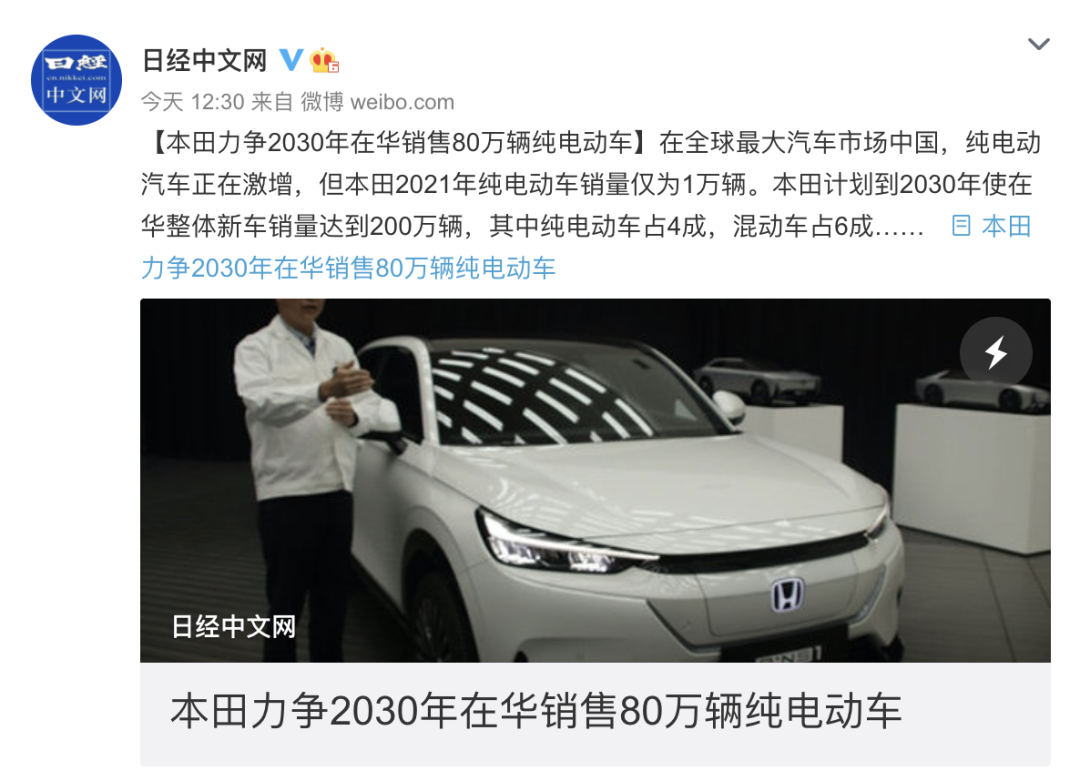
Nissan: stop selling fuel vehicles after 2025
On November 29th last year, Nissan officially released "Nissan Vision 2030". According to its plan, Nissan plans to invest 2 trillion yen ($17.6 billion) in the next five years to turn more product lines into electrification. For example, Nissan will launch 20 pure electric models and models equipped with Nissan e-POWER technology in the next five years. In addition, Nissan also said it will launch 23 electrified vehicles in fiscal year 2030. These include 15 electric vehicles. Nissan hopes to account for 50 per cent of global electric-driven models under its Nissan and Infiniti brands by fiscal year 2030 (2030.4.1-2031.3.31). In addition, Nissan announced plans to stop selling fuel cars after 2025 and will shift research and sales to pure electric and hybrid models.
In addition to the above car companies, including BMW, General Motors and Ford have also announced that they will stop selling fuel vehicles in the future. Among them, BMW Group will stop selling fuel vehicles in the European Union in 2030. BMW Group expects to launch 12 pure electric models in the Chinese market by 2023, covering almost all current market segments. By 2025, at least 1/4 of the cars sold by BMW Group in China will be pure electric vehicles. GM plans to stop selling fuel vehicles in 2035 and transition its products to zero-emission vehicles and pure electric vehicles in the same year. Ford announced that all passenger car series in Europe will achieve zero emissions by mid-2026 and will be fully electric by 2030; Jaguar plans to stop production of diesel locomotives by 2025 to become an electric car brand, and all its new cars sold will be pure electric vehicles by 2030; Volvo announced that it will become a pure electric brand by 2030 Hyundai Kia plans to stop selling fuel cars in the EU market in 2035 and fully electrify outside South Korea by 2040. According to the plan, Kia will introduce the pure electric model EV6 this year, and Asia will launch new electric models in the Chinese market every year from 2027. In terms of sales, Kia plans to sell 1.2 million pure electric vehicles by 2030, of which Kia aims to sell 160000 pure electric vehicles this year, 807000 in 2026 and finally 1.2 million by 2030; in addition, traditional luxury brands such as Aston Martin Rapid E and Maserati Alfieri have also switched to the new energy market in recent years.
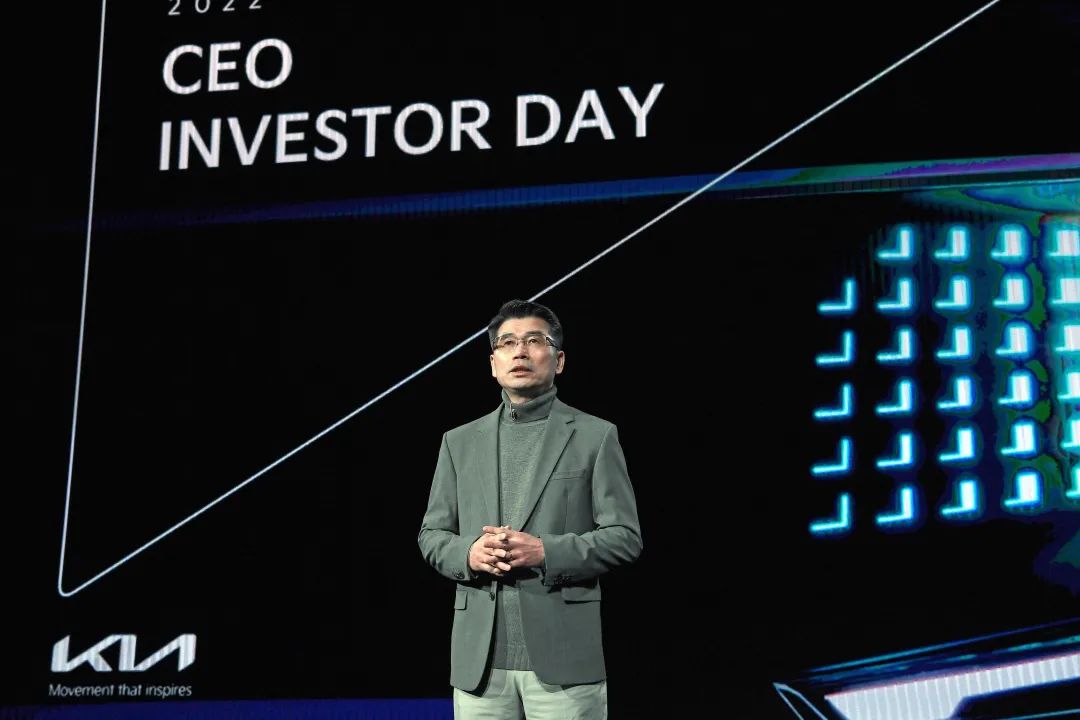
In fact, there are broad prospects for the growth of the electric car market, and it is only a matter of time before "electrification" will become the trend of automobile development sooner or later. Judging from the time point of stopping the sale of fuel vehicles announced by the above-mentioned car companies, most of the time for domestic car companies to stop selling fuel vehicles will be in 2025. At present, BYD has taken the lead to stop selling fuel vehicles, while a small number of car companies, such as BAIC and Chang'an, will also fully cut into electric vehicles in 2025. Most overseas car companies will be after 2030. Of course, it is not only the car companies that have announced the fuel ban timetable, but according to the concern of the automobile industry, many countries have also issued a timetable for banning the sale of fuel vehicles.
According to statistics, Norway announced a ban on the sale of conventional fuel vehicles in 2025; the Netherlands, California, Germany and India announced a ban on the sale of traditional fuel vehicles in 2030; France and the United Kingdom postponed the sale of traditional fuel vehicles for a decade and will ban the sale of traditional fuel vehicles in 2040. Among them, the British stop the sale of not only fuel vehicles, but also gas-electric hybrid cars.
In fact, the automobile is a complex industrial product, which generally has a long research and development cycle and life cycle, so it is not easy to completely "ban the sale of fuel vehicles". For car companies, the transformation from traditional fuel vehicles to new energy vehicles is both a challenge and an opportunity, but for consumers, traditional fuel vehicles will still occupy a dominant position, and users can continue to buy fuel models. Because it will take a decade or even decades to complete the transition from traditional fuel vehicles to new energy models.
Welcome to subscribe to the WeChat public account "Automotive Industry Focus" to get the first-hand insider information on the automotive industry and talk about things in the automotive circle. Welcome to break the news! WeChat ID autoWechat
Views: 0
*The comments in the above article only represent the author's personal views and do not represent the views and positions of this website. If you have more insights, please feel free to contribute and share.









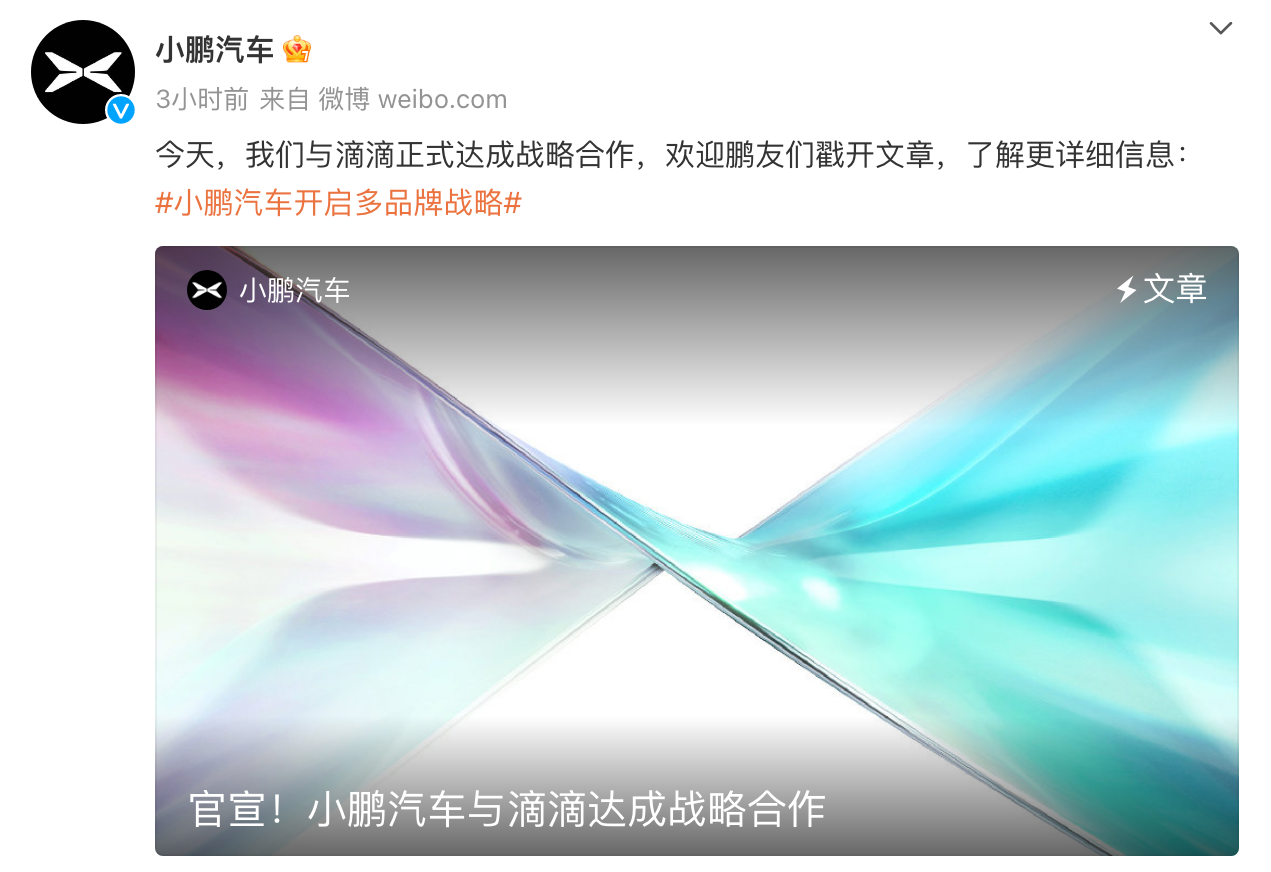

© 2024 AutoBeta.Net Tiger Media Company. All rights reserved.